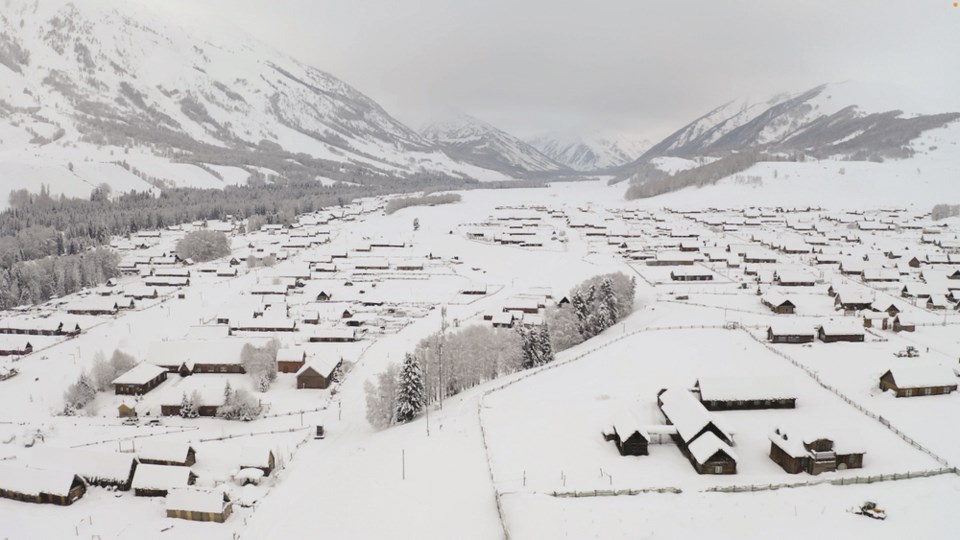On the face of it, the modern skier of today, what with the state-of-the-art gear and penchant for heli-fuelled descents, would seem to have little to learn from the traditional skier of yesteryear that relied on skis made from boiled wood planks and horsehair to get around.
But for Whistler filmmaker Chris Winters, co-director and producer of the new short doc, Return to Roots, there is much to learn from skiing’s original practitioners that goes beyond just sliding on snow.
“I’m trying to remind people that skiing is not just a frivolous rich person’s activity that has no real meaning on our overall history. It actually is a fundamental thing that was used for survival in winter climates,” he says. “The conversation is about civilization and the strength of civilization as much as it is about the actual sport.”
Return to Roots emerged out of a larger project called Snow Hunters tracing the origins of skiing that brought Winters and fellow Sea to Sky filmmaker Brian Hockenstein, Olympic gold-medal snowboarder Kaitlyn Farrington and pro skier Brennan Lagasse to the remote village of Kohm, also known as Hemu, in northwestern China in January 2020. After the long and arduous journey to get to the border village of a few hundred locals who still use skis as a form of transportation, their shoot was cut short by the coronavirus that was, at that time, only beginning to spread out of the eastern part of the country. Luckily, a local official had arranged for the team to board the last flight out of Altay City, some five hours away—but their relief was short-lived. About an hour in to their drive from Kohm, they learned that several large avalanches had blocked the only road out.
The group waited for hours, unsure of their next move, when suddenly the lights of an industrial-sized snow removal truck appeared, clearing just enough space for their cars to pass through.
“Essentially we had to leave after just a few days there. While it seemed to have ruined our whole project in a sense … we realized there was some good footage that we captured and we wanted to connect it to what everyone has been going through over the last couple years,” Winters says. “In lockdown, for a short time, people were more self-sufficient and more localized. They lived a simpler life, and in a way, it was following what we were hoping to achieve in terms of learning from a culture that is still like that by nature. So as we return to the roots of skiing, we’re also returning to the roots of how we live.”
But is skiing—an industry increasingly geared more towards convenience and the novice skier—ready to promote a more self-sufficient, back-to-basics approach?
“The reality is the ski industry is a business and going simpler is bad for business. I don’t really see the industry itself taking hold of this, although particularly during COVID a trend that has been building for a decade or so is backcountry touring,” says Winters. “It has become not just something fringe hardcore skiers do, but it’s becoming something you see other folks learn as they learn to ski at the same time.”
Given good snow is harder than ever to find these days, Winters believes it would behoove the modern skier to take a page out of the traditional skier’s playbook.
“In the future, we’re going to have to return to this kind of ancient style of hunting for snow if we’re going to continue to get out and enjoy this pastime, because climate change has made snow a little bit more endangered,” he says.
Winters’ vision for the original Snow Hunters series was to link the old ways of skiing with the new by meeting with China’s Olympic and emerging skiers in Beijing ahead of the 2022 Winter Games that kicked off last week. What’s obvious to anyone who has paid even the faintest attention to the emergence of skiing in China is that the country has invested big into its future—President Xi Jinping has personally called to get 300 million Chinese on skis. A big part of that push has come in Xinjiang, the troubled province that is home to the village of Kohm, which looks to become the battleground between traditional forms of skiing and China’s expansive ambitions. Home to the persecuted Muslim minority group, the Uyghurs, Xinjiang is also heavily marketed as China’s next winter mecca, even as human rights groups say more than a million Uyghurs have been detained against their will in recent years in China’s so-called “re-education camps.” But despite the country’s poor human rights records, Western snow-sport companies haven’t been able to resist the allure of a growing Chinese industry, which is predicted to become the world’s largest snow-sport market by 2025 on the back of this year’s Olympics.
Hit play below to watch Return to Roots.




